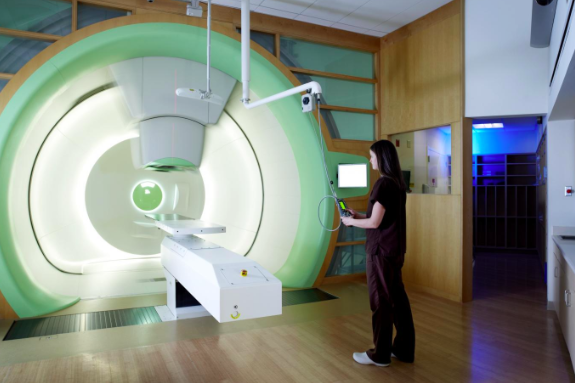
July 30, 2024
 Source/Perelman School of Medicine
Source/Perelman School of Medicine
Penn Medicine plans to open a fourth proton therapy center in University City at Penn Presbyterian. Proton therapy is a more precise form of radiation than traditional radiation therapy and has fewer side effects than other cancer treatments.
Penn Medicine will open a fourth proton therapy center, expanding its ability to provide patients with the non-invasive cancer treatment that is associated with fewer side effects than other cancer treatments.
Penn Medicine is building the new facility at Penn Presbyterian Medical Center, at 51 N. 39th St. in University City, and refurbishing its original Roberts Proton Therapy Center that opened in 2010 in the Perelman Center for Advanced Medicine, 3400 Civic Center Blvd., also in University City. The project will cost approximately $317 million, Kevin Mahoney, CEO of the University of Pennsylvania Health System, told the Philadelphia Business Journal. The new center, slated to open in 2027, will be built next to Penn Presbyterian.
The Roberts Proton Therapy Center treats more than 100 patients daily and is the largest center in the world for proton and conventional radiation therapy. Penn Medicine has two other proton therapy centers, one that opened in Lancaster in 2022 and another at Virtua Health's hospital in Voorhees, Camden County, that opened in 2023.
There are 45 proton centers in the United States, according to the National Association for Proton Therapy.
Proton therapy, a type of radiation therapy also known as proton beam therapy, uses the positively-charged particles to destroy cancer cells, causing little or no damage to surrounding tissue. Doctors have more control with proton therapy and can therefore use higher doses of radiation.
Because it is more precise than other types of cancer treatment, proton therapy can target tumors near organs. It is used when possible in children with cancer to reduce the amount of damage to healthy tissue. Proton therapy can also treat cancer that recurs after other radiation treatment.
Penn Medicine touts the treatment as less-invasive and having fewer side effects than other cancer therapies. A 2020 study showed that patients treated with proton therapy were less likely to experience severe side effects than patients treated with traditional radiation. Proton therapy can be used in combination with chemotherapy and other radiation treatments.
Most insurance plans in the U.S., including Medicare, cover proton therapy.